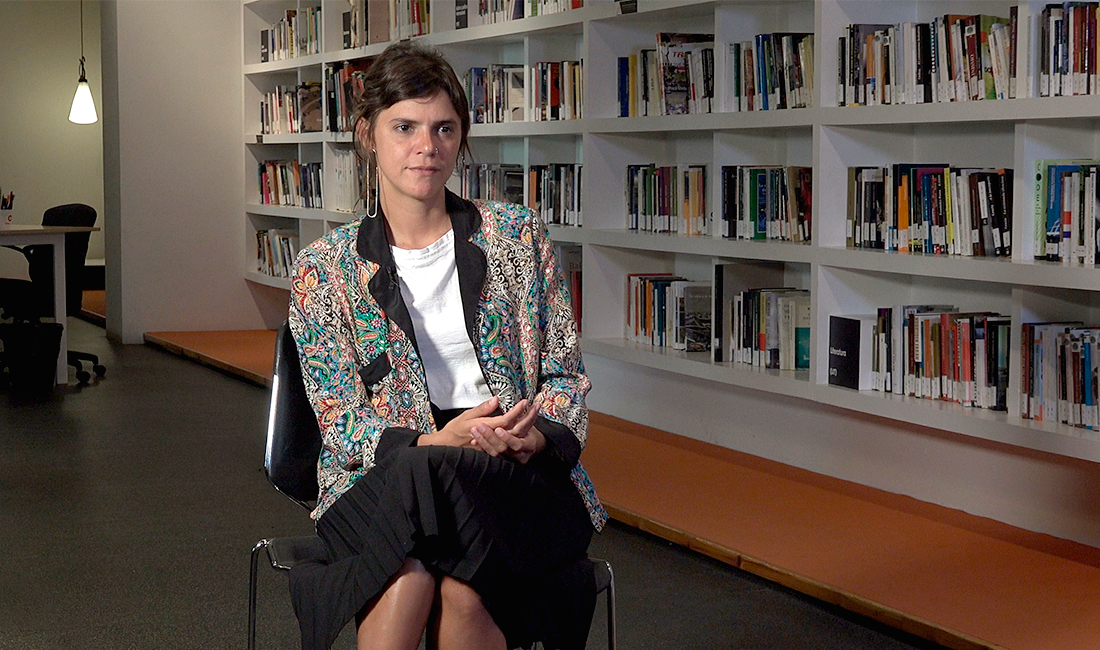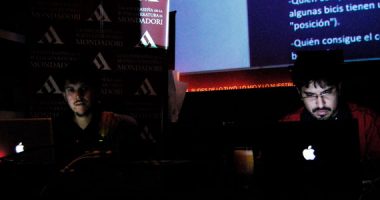Denouncing the things that we witness is a task that requires constant self-awareness, knowing where we are writing from, recognising the limitations of the position that we occupy in society and common sense, intelligence and sensitivity. We take advantage of the visit by Valeria Luiselli to the CCCB, to talk with her about the writing process, the right to talk about issues that are close to us but not our own, and feminism, among other subjects.
The other day I came upon a Twitter thread that questioned what it is that working-class literature actually does: does it relate to the extraction of the author’s class? The social context of its protagonists? Or is it enough, for example, to contribute something relevant to the working class? A literature that takes its position based on the class struggle, independently of the author’s socioeconomic origin. The analysis is interesting, because it puts the focus on the need to identify a proletarian view in the world of narrative, an area in which an evident class bias exists. People who narrate to us, people who edit, people who publish, people who are main characters are, in the majority, middle- or upper-class people. And this is also pointed out by a 2018 report published in the United Kingdom that analysed the composition of those who make up the creative or cultural industries in that country.
In this sense, also published recently was an article in Another Gaze that analysed Fleabag and Girls with a class perspective. It pointed to how certain capitalist and possibly racist logics had established, as generational tales or narratives, the stories of white, middle-class female protagonists, who live with irony their more or less self-destructive lives. “We should ask ourselves what it is that gives them the ability to be so brazen, and who is side-lined as collateral”, the article notes.
All of these questions led me to the interview with writer Valeria Luiselli (Mexico, 1983) who recently visited the CCCB. The Mexican author was visiting Barcelona to present her latest book, Desierto sonoro (Lost Children Archive). A frustrated romantic novel of destruction, an essentially political travel novel, that returns to an issue that the author had already approached in her previous essay, Los niños perdidos, in which she takes an in-depth look at the situation of undocumented minors who cross the border from Mexico to the United States articulated through the real questions that are formulated in the admissions questionnaire: “Why did you come to the United States? Did anything happen on your trip to the US that scared you or hurt you?”
In El Cultural, I read that Luiselli wanted to write that essay first of all in the form of a novel, but she quickly aborted the mission because she realised that it was becoming a medium – that of the novelised work – for “a purpose”, i.e. “as a receptacle, a deposit for the testimonies that I was hearing”. The novel that never was served her, and only her, to channel her fury, her frustration or her sadness. But it was doubtful whether it would serve anyone else. Luiselli herself affirms in the interview that “the novel was frankly unreadable”. For that reason, she decided to abandon it.
I find the subject a relevant one: that point at which an author acquires awareness of the position she has with respect to a subject and, according to that, decides to erase her tracks, eliminate herself. She realises that she does not have legitimacy to talk about something or somebody. She takes conscience of the fact that her view is not useful. “Where are our possibilities and limitations? But also, what rights do we have to talk about issues that are close to us but that are not our own? What ethical responsibility do we acquire when we approach an issue, where are the boundaries of our right to investigate?” explains Luiselli. Every time she embarks on a project as a writer, she asks herself this question.
Valeria Luiselli recounts that she had a “mobile, nomadic” childhood, which from a very young age situated her in a “liminal” space. Luiselli has lived in Costa Rica, South Africa, South Korea and India. She now lives in the United States. Her life on the move has shown her a way of being, of existing in the world, of feeling comfortable as a “perennial observer”. However, she is not indifferent to the class privilege that being the daughter of a diplomat involves. Her nomadic childhood, unlike that of the undocumented minors in Mexico, of the migrants and the refugees, is a marker of class. And she is aware of that. Regarding class betrayal, Italian writer Alberto Prunetti affirms that “writing working-class stories is their way of not being a class traitor”. And something similar is activated in the literature of Luiselli, who has a deliberate vocation to understand and explain alterity without being the one who narrates it, but rather by providing a channel. Because she has one.
Doing, talking about any other subject, tackling it from another position, is also for her a kind of betrayal.
“As a Mexican, as a Latino woman in the United States, I am aware that I arrived here ten years ago in privileged circumstances. In other words, I arrived in the United States to study for a PhD and I didn’t travel here by land, but by air and with a student visa”, she argues. That conscience, that being aware that she is situated on one side and not on the other, is the departure point from where she starts writing. Her novels do not avoid the political question nor the social or material conditions that make possible for her, writing, and for her characters, life itself. In Desierto sonoro the two main characters, a married couple who are documentarists going through a life crisis, cross the desert to Arizona. The diaspora of children reaching the southern frontier in search of asylum is a central theme in the plot, however, the author does not try to appropriate a voice that is not her own. The couple are middle class and it is from that viewpoint – without paternalism, without condescendence, but with a vast knowledge of the issue – from where Luiselli approaches the issue of child migrants. In another interview in SModa, Luiselli affirmed that, in her case, she is not “a writer who can generate a kind of vacuum packaging, a bubble in which to write”. She weaves threads, she says, “always in a fictional way”, but there are certain fibres that always come from her personal life and from her experience.

“As a member of the Hispanic community, but in circumstances radically different to those of the majority, I feel that I have the responsibility to use the spaces that my work has opened up for me – spaces for publication, for public debate, spaces for opinion – to open up and make way for my community”, she suggests. In this sense, every time she embarks on a new plot, Luiselli undertakes immersive, almost journalistic work. Before writing Desierto sonoro and Los niños perdidos, Luiselli worked as a translator for the defence of migrant children in the immigration court of New York. For La historia de mis dientes (The Story of My Teeth) her second novel, Luiselli collaborated with workers from the Jumex juice factory in Mexico.
“I think that remaining silent is not an option and that, to the contrary, it is important to denounce the things that we witness, especially if we are talking about constant political and institutional violence, exercised by governing groups or by the classes in power”, says Luiselli. The job, she says, requires a constant self-awareness. “Of knowing from where one is writing, recognising the limitations of the position that one occupies and having common sense, intelligence and sensitivity”. In this sense, the text by Prunetti, translated in La Marea, makes it clear that one can frame, within a working-class narrative, texts written by authors of middle-class extraction. It offers as examples Émile Zola and George Orwell, among others.
Intellectual Ramón Fernández, in a letter written to André Gide in the 1930s thus summarised an idea that, I believe, remains in force today. “It is a case of winning over the intellectuals for the working-class cause, making them take awareness of the identity that exists between their spiritual duty and their condition as producers”.
The question of the function of art, the function of the left-wing intellectual in literature has been amply discussed in recent centuries. Philosopher Walter Benjamin wondered in his address about his position when joining the proletarian forces and the risk that he ran of becoming a simple “ideological patron”, which he called the trap of logocracy. In other words: when the politicised and politically compromised work is converted into a goal in itself, that capitalises the intellectual and ends up even further crushing the oppressed class, the narrated class. The German thinker criticises those authors who only make use of the “tendency”, but that forget that such a performance has a true quality.
The reflections of Luiselli around the opposition that she occupies every time she embarks on a book are interesting and leave patently clear that in the author there exists a latent self-awareness in the whole process. “Each one of my books has required from me a period of understanding what is going to be the process between the method and the result and I am interested above all in shortening the distance between those two points. The process through which I write a book must leave as a result a set of fingerprints in such a way that the reader who approaches the project can be led to its roots”, Luiselli concludes.




Paola Estrada Villafuerte | 21 August 2021
Increíble artículo, gracias!
Leave a comment